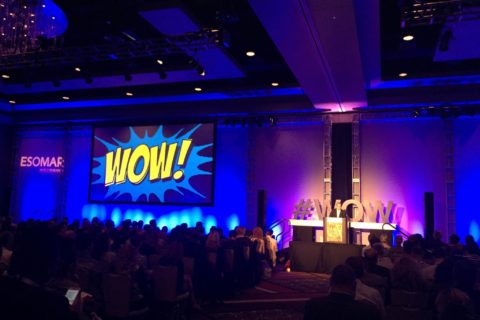By Stephanie Alaimo
Relating to our consumers – who we can sometimes forget to regard as People – emerged as an important theme in Monday’s presentations. Taken together, the following presentations argue that generating greater empathy, which requires more authentic interactions with our research subjects, should be one of our most important goals as market researchers.
Importantly, we must not forget the amount of work we are asking our respondents to complete, we must use methodologies that situate people within their daily lives so that we do not neglect context, and we must understand the impact of consumer goods on people’s lives. Several of Monday’s presenters began to swap the word “consumer” for the word “person” or “people.” This is a very effective change in MR language which should certainly be strong enough to remind us all to contextualize and humanize our research about…. People!
Empathy, the ability to deeply relate to and share the experience of others, seemed to be the greatest expression of this change. Thomas Troch of InSites Consulting USA, in his talk “Enter the Experience Economy: Increasing memory and empathy to drive change” noted that empathy is the real driver of change resulting from market research. In his presentation, he frequently reminded us to consider consumers as people – because they are. In the experience economy, where people (not just consumers!) are motivated by new experiences, we must be willing and able to capture and relate to the fullness and richness of human experience, even as we interact with consumer goods and services. Thomas used 3D footage of himself brushing his teeth to show that we can gain an increased ability to relate through immersive methodologies.
Equally importantly, we must shift our thinking about what it is that we provide to our clients. Our empathy should not be reserved for the people we study. Of course, we want to provide the most accessible knowledge possible to our clients. We do, after all, seek to provide a service. Why is a service more valuable? When we provide raw data, we make our research into a simple, untransformed commodity. By providing a more accessible report, we transform it into a good, which has greater value. Finally, when we provide workshops and presentations for our clients, we provide a truly valuable service. The interactive service of a workshop or presentation more closely mirrors the types of interactive and complete research that we should strive for, in order to increase our own empathy for the people we study. Finally, when we provide a workshop, we can most effectively transmit the empathy that we have learned to our clients. This will be the greatest driver of impact. It is also the most empathetic way to meet our clients needs for understanding.
Some of the most surprising findings presented in Monday’s workshops were those presented by Nikki Lavoie, of MindSpark International. Lavoie also discussed empathy in her talk “Connecting With Consumers: A New Way of Plugging In: Why empathy is the emotional trailblazer in the world of social media and screens.” She emphasized the need to understand what drives a person to participate in market research. Of course, our most habitual, quickest answer would be “an incentive.” Lavoie questions this assumption. Drawing on research she conducted evaluating the effects of incentives on participation and the quality of responses, as well as on behavioral research, she notes that financial incentives greatly change the nature of any interaction we might have. She found that non-incentivized, volunteers that participate in research participated in research just as completely as incentivized participants. And, most shockingly, they dropped out less. These respondents were motivated by – guess what – empathy. Volunteers are typically motivated by the desire to do something nice for someone, or to do something nice for a community, or the desire to improve the world. Perhaps we can connect to people more easily, as a profession, if we remember all the directions in which empathy can flow, and in turn, seek to encourage empathy in all of our interactions.
Empathy was also invoked by Luke Sehmer of Research Now UK, and Melanie Courtright of Research Now US. In their talk “Clipboards, Calls and Focus Groupies: The public perception of market research and the implications for the future” they alerted us to the fact that many people do not trust market research, or market researchers. What a finding! To nuance this point, they found that in research where a participant directly engages with a researcher on the telephone, there is more trust. Research where the person does not have direct contact, such as a Google survey, scores much lower for trust. But, this is not surprising, when we think about empathy. Empathy is relating to and sharing experiences and emotions. It is a very human thing. A Google survey lacks most of the tools required to generate empathy. And empathy can generate trust. So, empathy may be the solution to trust for our industry. We must solve for trust if we are going to expect people to discuss their lives with us. Otherwise, we risk very low quality results.
How do empathy and understanding relate? Well, if we cannot empathize with people, we simply cannot understand them. They may answer our questions, participate in our exercises, or even give us their opinions. But, if we cannot contextualize their lived experiences, if we cannot situation our questions within the systems of their lives, the insights that we can draw from their answers are likely to remain extremely superficial. Even worse, we may simply miss very important conclusions by our failure to relate. And for our clients, when change and innovation are driven by empathy, they are more likely to be solutions which will relate directly to people’s needs, desires, and lives.
Stephanie Alaimo is one of the official RWC bloggers for Congress 2016.


